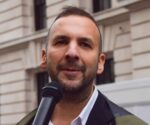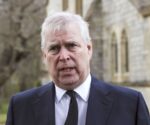Appetite loss ended in horror diagnosis – what I want for other patients now it’s over | UK | News
I’m adding my voice to the Daily Express’s Cancer Care campaign because while I’ve benefited from mental health support myself, my family found this independently rather than through my medical team. My symptoms started nine years ago, with frequent sickness and loss of appetite. At a GP appointment, I was prescribed antidepressants for stress, and I was also referred to Whipps Cross University Hospital in Walthamstow for a CT scan, but I never received an appointment.
As my condition deteriorated, my family sought a second opinion at our local hospital in Chelmsford. By this stage, I could barely walk, and my behaviour had changed, which meant I struggled to look after my daughter, Rose, who was then three years old. A CT scan at Chelmsford revealed a mass on my brain, and I was transferred by ambulance to Queen’s Hospital in Romford.
I had emergency surgery to remove the mass. A biopsy confirmed what type of brain tumour I had, and I was told I’d need further surgery – an awake craniotomy.
When my symptoms started I just thought that it was nothing. I was changing jobs and moving house, so it seemed logical that I could be stressed or depressed.
But, as time went on, it became clear that something else was wrong. The tablets weren’t working, and I was sick so frequently that I couldn’t convince myself not to worry anymore. But not once did I ever think that it could be a brain tumour.
Nobody told me what type of tumour it was until I was discharged. I think this was very sensible as finding out that it was cancerous would have sent me into freefall.
My dad said not to worry and that they would get me to my 40th birthday. But, of course, I wanted more than that – to be there for my family for years to come.
After my surgery, I temporarily lost the feeling down the right side of my body, which affected my ability to walk. This was a problem for me as a pianist, teacher, and mum.
I am very independent, and I really struggled to stay still when I was in the hospital. I would get up and walk around to regain movement, only to be told to go back to bed, but I couldn’t wait to get out of there.
I couldn’t look after my little girl, so my husband Steve and my parents took over. I am fortunate to have had their help, and I am grateful for that, but I felt like I was losing her as caring for her was not my responsibility anymore.
I don’t think Rose really understood what was going on, which made it difficult for us all.
I had chemotherapy and radiotherapy and regained the use of the right side of my body through physiotherapy and other treatments.
I received counselling, support and advice from my local hospice.
At this time, my family contacted The Brain Tumour Charity for information and guidance, particularly through the charity’s private Facebook groups, which provide an opportunity to connect with others who have been affected by a brain tumour diagnosis.
We are a close family, so I think my siblings and parents really struggled to understand what I was going through. They wanted to be able to help in some way if they could, consider my options, and think more positively about it all.
The Brain Tumour Charity really helped them with all of this.
I have regular MRI scans to monitor for any signs of regrowth, but thankfully, my condition is currently stable. In the years since my diagnosis, I’ve taken on the London Marathon and other challenges to raise more than £20,000 for The Brain Tumour Charity and have also become one of their advocates, an “involvement champion.”
If I can do something to help other people who have been affected by a brain tumour diagnosis, then I will do it.
As a mother and a teacher, stories about children being diagnosed with brain tumours really affect me, so I want to do my bit to try and help others, of all ages, in the future.
The brain is such a crucial part of what makes us who we are, so brain tumours are a uniquely cruel type of cancer that can rob a person of so much.
My tumour is still there, and it will continue to be, but I won’t let that stop me from putting on my trainers and doing something worthwhile.
Part of the Daily Express campaign is calling for all cancer patients to have a holistic needs assessment, and I’m one of the patients who did have one. But my memory of it is a bit vague. I wasn’t able to write my answers down, so it was discussion-based.
I remember talking more about my physical needs than anything else. I also had two clinical nurse specialists – one of whom I can still call today.
When I was first diagnosed, I just wanted it to go away. I remember walking around the garden asking my husband, “Why me?” But then I thought, why anyone?
A brain tumour affects everything: how you move, how you speak, how you think, how you eat, how you brush your teeth, and so on. I do believe it has affected my mental health massively.
In some ways, it has been a positive thing, but mostly I find myself just breaking down in tears at the slightest thing. Therapy or counselling is definitely something that should be offered.
I wasn’t signposted to anywhere by my hospital, but I think my family had done all the research before they could have done.
My parents were supporting a local hospice called The J’s, so I was immediately taken in by them. I think they may have also referred me to Farleigh Hospice. So, I had two lovely ladies helping me throughout that stage.
One of them suggested music therapy for my daughter, and the other suggested couples therapy for my husband and me. We took up both.
Since then, things have been going well. We had a miracle baby in October 2021, which was amazing.
I’m so thankful that I have kept well enough to complete our family.









